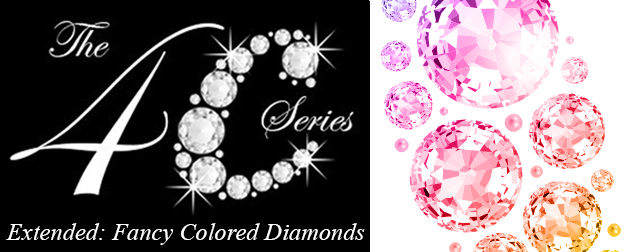A Guide to Shopping for Colored Diamond Engagement Rings
If you’re considering buying an engagement ring with a fancy colored diamond instead of a classic white diamond, you’re very much in style! Placing a colored diamond as the center stone is a popular trend right now. Some feel the significance of a rare, colored diamond shows how truly unique your love is and gives more options than the classic white diamond. Since colored diamond engagement rings are not displayed as plentifully as white diamonds in jewelry shops, we want you to be sure you understand what you are looking for. With some suggestions from our diamond experts, we have listed the 4 C’s of colored diamonds to help you shop!
Colored Diamonds Cut
If you haven’t seen our classic diamond 4 C’s series, we’ll give you a little insight on what defines a diamond’s cut as well as the other factors you’ll want to be aware of when shopping for engagement rings. A cut grade is given based on how the diamond looks in a ‘face-up’ position and how the light plays off the symmetry of the cuts. Diamond cut is an aspect that plays a large role in the look of colored diamonds because certain cuts can intensify the color. For example, using a radiant cut allows light to play off the color in the stone which can have the effect of a deeper color. The general rule states that the more intense the color of the diamond, the more rare and valuable it is so don’t dismiss the grade of the cut! You can always find this information in the GIA diamond grading report, which reputable jewelers will happily show you.
Colored Diamonds Color Scale
This is the most important “C” of the four because colored diamonds are mainly graded on their color and the intensity of that color. Being the main value factor for colored diamonds means that even the slightest difference in color has an impact on the grade. The complex and specialized grading system from GIA’s diamond graders has to account for all colors. It’s important to note that many colored diamonds are not dark, distinct shades of color but medium to light tones. So why is this important? Well, as with most things in life, rarity equates to higher value. So, depending on your engagement ring budget, here are the types of colored diamonds from most valuable to more common and budget-friendly!
Most Rare Colored Diamonds: Red, Green, Blue, Orange and Pink
Most Common Colored Diamonds: Brown, Yellow, Grey and Black
Colored Diamonds Clarity
Clarity grades are based on flaws, or inclusions, in a diamond. However, colored diamonds, as we mentioned, are mainly graded on their color and it’s intensity. So even if a colored diamond has quite a few inclusions it can still be favorably regarded if it is a highly sought after color and the ‘face-up’ look is pleasing to the eye. The one factor of clarity in colored diamonds that will diminish its value is if the diamond’s durability is affected by the inclusions and that will be reflected in the price.
Colored Diamond Carat Weight
The most straightforward of the 4 C’s grading scale is carat weight. The larger the diamond, the more valuable it is. If you are viewing engagement rings that have other diamonds in the setting, be sure to ask for the carat weight of just the center diamond. Sometimes the ‘total carat weight’ is listed on a ring but it includes all the stones in the setting so we just want you to be sure you know exactly what you are getting!
Hopefully you found this information helpful and can be more confident in your colored diamond engagement ring search. We are always available to help with all your jewelry questions so feel free to call or visit us here in Gilbert!
